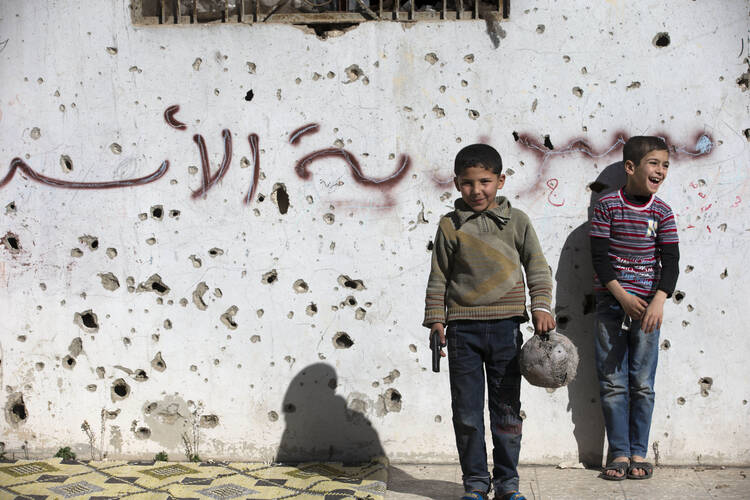A cease-fire brokered by the United States and Russia came into effect across Syria on Saturday, marking the biggest international push to reduce violence in the country's devastating conflict, but the Islamic State group and al-Qaida's branch in Syria, the Nusra Front, were excluded.
The cease-fire aims to bring representatives of the Syrian government and the opposition back to the negotiating table in Geneva for talks on a political transition. The U.N.'s envoy, Staffan de Mistura, announced that peace talks would resume on March 7 if the cessation of hostilities "largely holds."
If they do, it would be the first time international negotiations have brought any degree of quiet in Syria's five-year civil war. But success requires adherence by multiple armed factions—and the truce is made more fragile because it allows fighting to continue against the Islamic State group and Nusra Front, which could easily re-ignite broader warfare.
The Syrian government and the opposition, including nearly 100 rebel groups, have said they will abide by the cease-fire despite serious skepticism about chances for success.
Less than an hour before the truce was set to begin, the 15-member Security Council unanimously endorsed the agreement worked out between the United States and Russia.
De Mistura told the Security Council via video conference from Geneva that he hoped the cease-fire would provide a chance for humanitarian aid to reach those battered by Syria's brutal war and allow for a political solution.
White House spokesman Josh Earnest said the U.S. didn't expect to be able to judge the cease-fire's success or failure within the first days or even weeks.
"We do anticipate we're going to encounter some speed bumps along the way," Earnest said. "There will be violations."
On Friday, hours before the cease-fire came into effect, warplanes unleashed airstrikes against rebel-held positions in the suburbs of the Syrian capital and near the northern city of Aleppo.
The last barrages came as the main Syrian opposition and rebel umbrella group said dozens of factions—97 groups in all—had agreed to abide by the truce. The High Negotiations Committee, or HNC, said a military committee has been formed to follow up on adherence.
The Britain-based Syrian Observatory for Human Rights said the warplanes in Friday's strikes were believed to be Russian. The Kremlin did not comment on the latest developments but denied allegations that the Russian air force bombed civilian positions east of Damascus the previous day.
The rebel-held Damascus suburb of Douma was hit 40 times on Friday, the Observatory said, along with other areas east of the capital, killing at least eight people, including three women and four children.
Mazen al-Shami, an activist based in the area, said the warplanes were Russian, adding that they carried out some 60 air raids. He said 25 strikes targeted Douma. "The air raids intensified after the revolutionary factions said they will abide by the cease-fire," al-Shami said via Skype.
Stephane Dujarric, the spokesman for the U.N. secretary-general, told reporters in New York that the increase of military activity was "tragic but unfortunately not surprising."
"The only thing that is required is for people to take their fingers off the trigger," he said.
Late Thursday, U.S. President Barack Obama expressed hope that the cease-fire would lead to a political settlement to end the civil war and allow a more intense focus on battling the Islamic State group. He said he doesn't expect the truce to immediately end hostilities after years of bloodshed between forces loyal to Syrian President Bashar Assad and rebels who want to end his reign.
Announced just this week, the cease-fire is a "test" of whether the parties are committed to broader negotiations over a political transition, a new constitution and holding free elections, Obama said. He said Syria's future cannot include Assad as president, which is a chief point of contention with Russia and Iran, who support the Syrian leader.
"We are certain that there will continue to be fighting," Obama said, noting that IS, the Nusra Front and other militant groups are not part of the negotiations and the truce.
Obama put the onus on Russia and its allies—including the Assad government—to live up to their commitments under the agreement. The elusive cease-fire deal was reached only after a monthslong Russian air campaign that the U.S. says strengthened Assad's hand and allowed his forces to retake territory, altering the balance of power in the Syrian civil war.
"The world will be watching," Obama said.
Speaking to reporters in Washington on Friday, State Department spokesman Mark Toner called it "put up or shut up" time for Russia to prove its seriousness about ending the fighting and starting a political transition by adhering to its pledge not to target "groups that we consider the moderate opposition."
In Moscow, Russian President Vladimir Putin said his country will keep hitting "terrorist organizations" in Syria even after the truce is implemented.
The opposition umbrella, HNC, said in a statement that the Syrian "regime and its allies should not exploit the (truce) and continue with their hostilities against opposition factions under the pretext of fighting terrorists."
___
Associated Press writers Suzan Fraser in Ankara, Turkey, and Kevin Freking and Bradley Klapper in Washington and Michael Astor in New York and Jamey Keaten in Geneva contributed to this report.
Copyright 2016 The Associated Press. All rights reserved. This material may not be published, broadcast, rewritten or redistributed.







